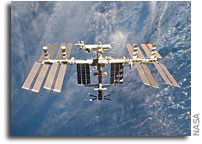PSU in Space: Experiments underway on the International Space Station

Portland, OR – A team of researchers from Portland State University (PSU), NASA, and the University of Bremen, Germany, are conducting a remote-controlled experiment taking place on the International Space Station (ISS). The team members are hoping to learn important information that may change the way fuel systems are designed for the next generation of spacecraft.
Their work is happening in a lab at PSU’s Maseeh College of Engineering and Computer Science, and also at the University of Bremen. Working in shifts from the two locations, the American and German teams are able to manage the experiments 24 hours a day.
The room at PSU is filled with computers and large screens showing real-time video of the experiment setup and a constantly shifting view from the space station as it orbits Earth. The ISS is a scientific lab that orbits the Earth with a crew of six astronauts. Institutions from all over the world compete for use of the station in order to do zero-gravity experiments.
The goal of this series of experiments is to test how fluid in specially shaped conduits behaves in zero gravity. The scientists on Earth – at PSU and at the University of Bremen – are manipulating the fluid movement to see at what point bubbles form. Formation of bubbles decreases fuel efficiency, and is particular to zero-gravity situations. Fuel tanks on spacecraft are designed in a way that minimizes this occurrence, but these experiments may shed light on how tanks might be designed smaller – a logistical advantage in sending any kind of craft into space, according to Bob Green, one of the NASA scientists working temporarily at PSU.
Both PSU and the University of Bremen’s ZARM institute are known for zero-gravity research, primarily with the use of drop towers – tall structures from which items are dropped, achieving temporary weightlessness. Scientists can measure changes in the items when they’re in the weightless state, which lasts just a few seconds. The experiments aboard the ISS are a chance to make tests in a state of prolonged weightlessness.
“It’s just great for our students to have this exposure and perform with teams at this level,” said Renjeng Su, dean of Maseeh College.
Equipment for the joint PSU/ZARM experiments was delivered to the ISS from NASA’s space shuttle in 2010. The equipment was set up by astronaut Mike Fossum on Sept. 13 of this year, and researchers at the two ground stations in Portland and Bremen began collecting data on Sept. 21. The experiments are expected to continue until Oct. 15, although they may be extended to Oct. 29, according to Mark Weislogel, PSU professor of mechanical engineering and the PSU team leader.
In addition to Weislogel and Green, the Portland team includes PSU research associate Yongkang Chen; NASA researcher Lauren Sharp; University of Bremen/ZARM researcher Peter Canfield; and PSU engineering students Will Blackmore, Ryan Jenson, Drew Wollman, Christiana Poanesa, and Briand Oaks.
About Portland State University (PSU)
Located in Portland, Oregon, PSU has about 30,000 undergraduate and graduate students. PSU’s motto is “Let Knowledge Serve the City,” and we provide every student with opportunities to work with businesses, schools and organizations on real-world projects. Our downtown campus exhibits PSU’s commitment to sustainability with green buildings, while sustainability is incorporated into much of the curriculum.









